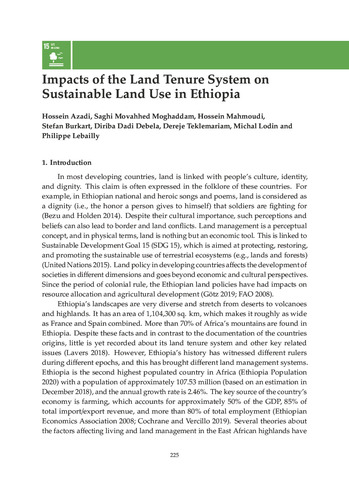Impacts of the land tenure system on sustainable land use in Ethiopia
On Earth, land is the most vital resource from which living things derive their essential necessities. There are many methods for managing and maintaining this vital resource in a sustainable manner, but it is more important to first understand the root cause of malfunctioning land management strategies. This chapter aims at understanding the underlying causes of socio-economic and policy-related factors affecting the sustainability of land tenure systems in Ethiopia. It also presents a review of historical and sociopolitical literature to evaluate the challenges with an insecure land tenure system, which lead to land degradation, soil erosion and low incomes. In most developing countries, systematic evaluation mechanisms of land tenure performance are very inadequate. In particular, Ethiopia has no systematic framework for assessing and measuring the state of its land tenure system. In this line, this study applies a systematic review to explore theoretical considerations and overviews on current estimates related to land tenure security in Ethiopia. Through an in-depth literature review and a qualitative analytical approach, the results identified a collection of good practices and indicators that can provide a framework for a systematic evaluation of sustainable land use in Ethiopia. The findings also showed performance gaps in land management, the application of enacted legislation and the allocation of land for agricultural investments. This study provides recommendations to federal and regional institutions with a mandate for land management, land holding and resource rights and land use on how to resolve these bottlenecks.

